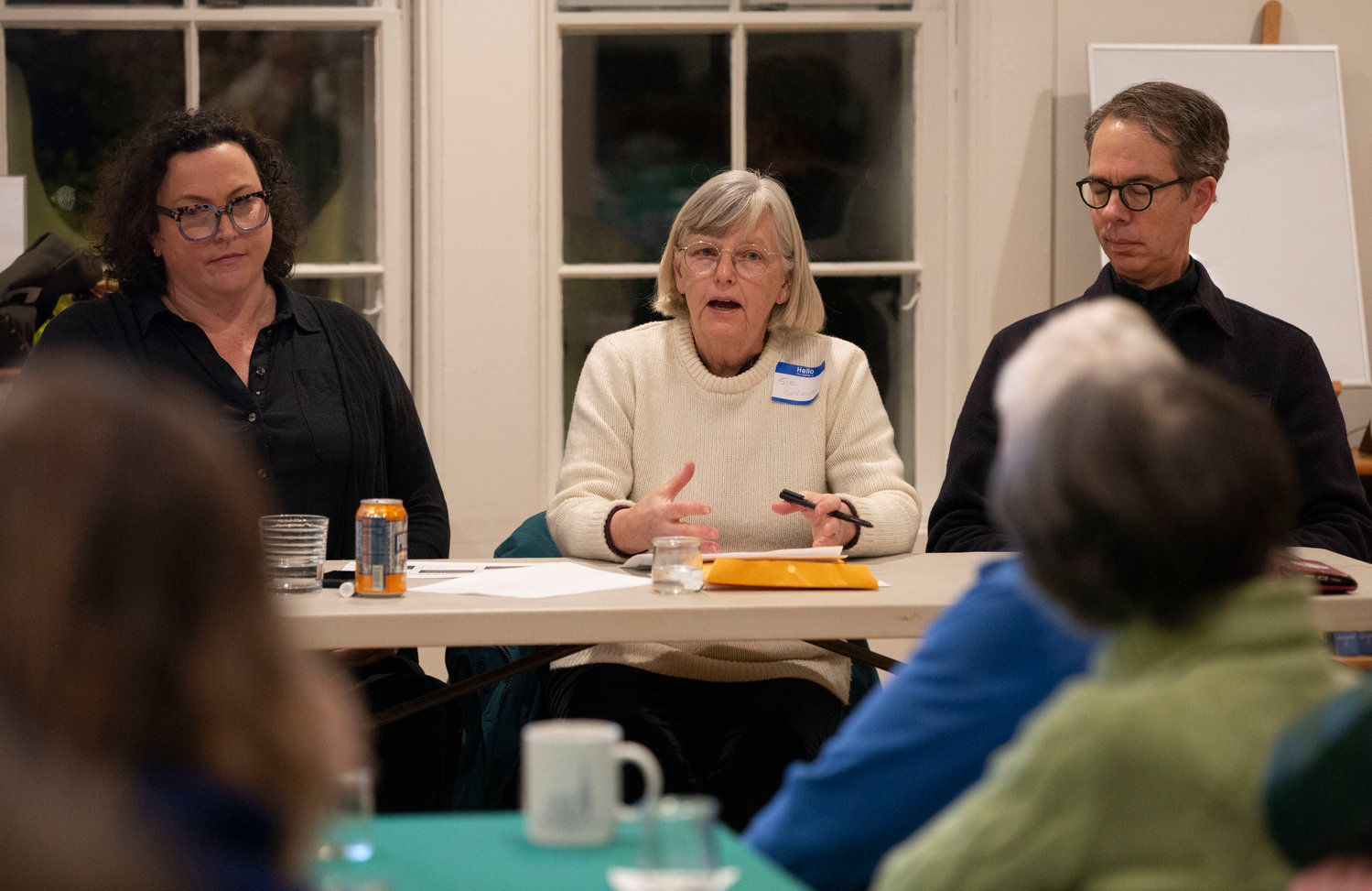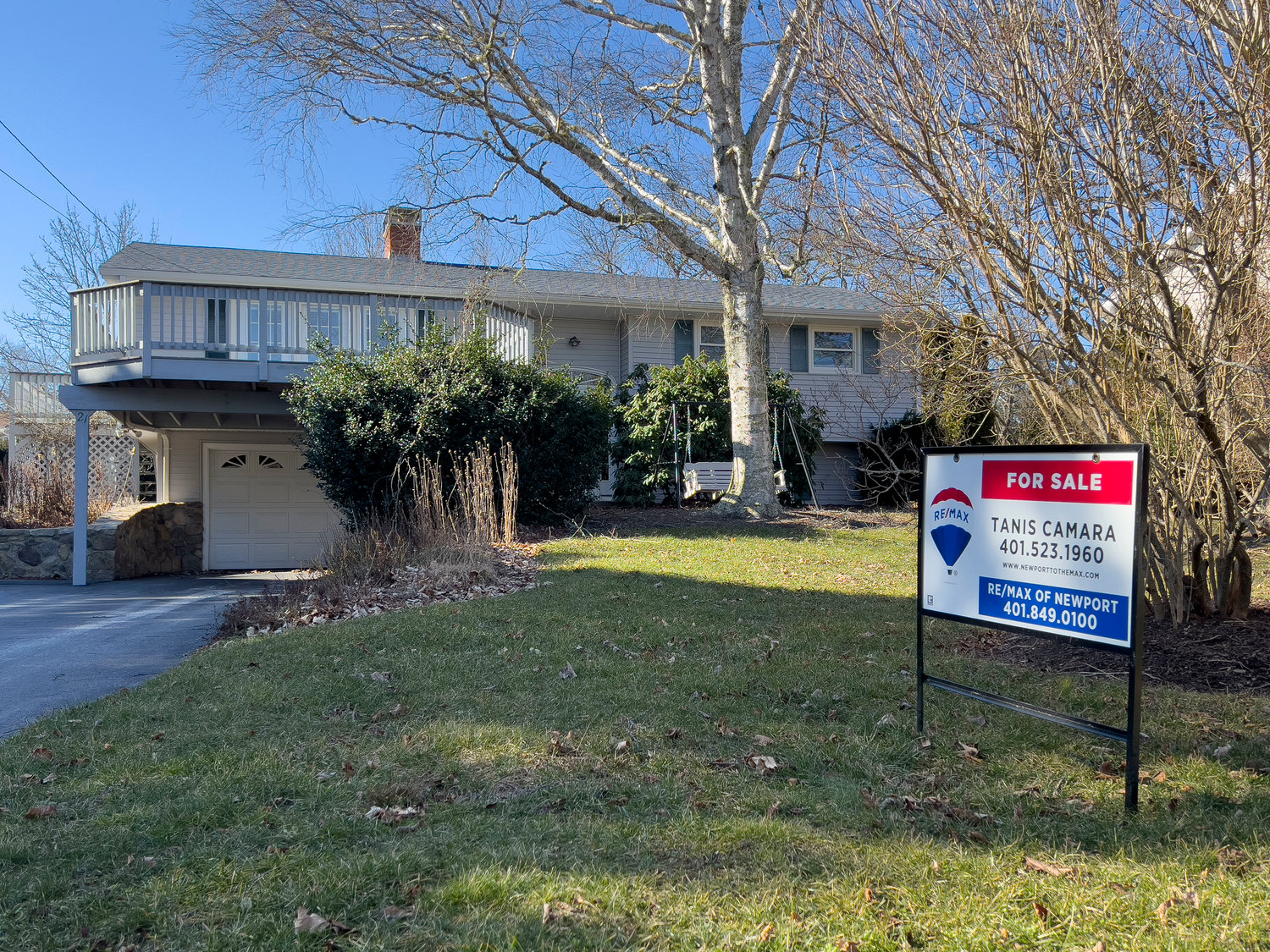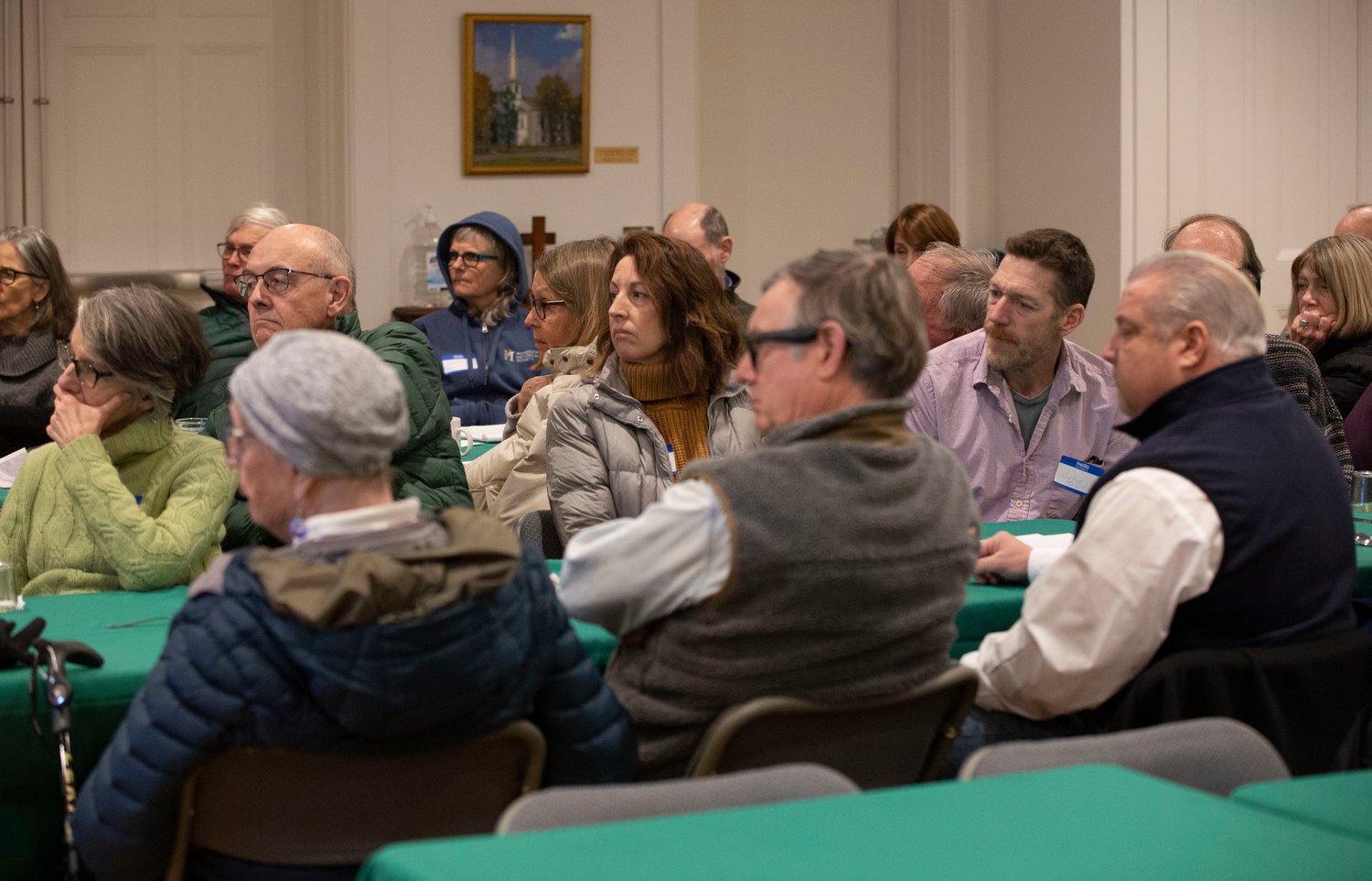As home prices soar, advocates ponder Little Compton's future
Little Compton is currently home to just nine ’affordable’ housing units, while most of town's available housing stock remains out of reach to many
His years on the Little Compton Housing Trust haven’t been easy or admittedly, very fruitful. But Patrick Bowen believes 2023 could bring a sea change in the availability of affordable housing …
This item is available in full to subscribers.
Please log in to continue |
Register to post eventsIf you'd like to post an event to our calendar, you can create a free account by clicking here. Note that free accounts do not have access to our subscriber-only content. |
Day pass subscribers
Are you a day pass subscriber who needs to log in? Click here to continue.
As home prices soar, advocates ponder Little Compton's future
Little Compton is currently home to just nine ’affordable’ housing units, while most of town's available housing stock remains out of reach to many
His years on the Little Compton Housing Trust haven’t been easy or admittedly, very fruitful. But Patrick Bowen believes 2023 could bring a sea change in the availability of affordable housing in one of Rhode Island’s most expensive towns.
Bowen, who joined the trust 10 years ago and currently serves as its president, is among a growing number of residents working to increase the availability of affordable housing in Little Compton. And like others, including members of the United Congregational Church of Little Compton, he is optimistic that people are starting to listen.
"We’re poised to get into some really good work," he said recently. "I guess one thing I’d like to impart is hope — I don’t think it’s too late, I don’t think we’ve gone too far."
A study, a church, and a flicker
Friday night brought bitter wind and cold, but the vestry room at the UCC was full of warmth.
Less than a month after an extensive HousingWorksRI study took the closest look at the need for affordable housing Little Compton has seen since the formation of the housing trust, members of the church’s Thriving Congregations Committee brought together trust members and affordable housing advocates to talk about how they might turn the tide on behalf of the working class, tradespeople, farmers, the elderly and disabled, young families and others who currently have very little chance to own or even rent property in Little Compton.
Right now the numbers don’t add up, speakers agreed.
While the state requires towns to designate 10 percent of their housing stock as ‘affordable’ to those of low to moderate income, Little Compton’s ‘affordable’ stock now hovers at just .56 percent — a little over five percent of the state’s 10 percent goal. In all, there are nine affordable housing units in town — three homes built by the non-profit Church Community Housing Corporation, which serves all of Newport County, and six rental units just off the Commons.
Meanwhile, the cost of housing here has risen dramatically over the past three years. The average median home price in Little Compton in 2022 was $875,000, and over the course of the year the average selling price in town topped $1.4 million. The most inexpensive home that sold went for $489,000.
As a result, panel members suggested, the very fabric of Little Compton — its farming roots, its sense of community and perhaps most importantly, the ability for younger residents to come to or stay in town, is fading.
In researching the impact of rising prices, church outreach member Victoria Talbot found that from 2000 to 2021, the number of residents age 18 or younger here dropped from about 24 percent of the town’s population to 12 percent. During that same period, the number of vacant seasonal/vacation homes rose by a similar, if inverse, rate. In 2000, about 16 percent of the town’s stock of homes were seasonal or rental. By 2021, that number had more than doubled, to 35 percent.
What did the study find?
Many of the church’s findings mirror those in the HousingWorksRI study, which was authorized under Little Compton’s 2018 update to the Comprehensive Plan and presented to the town council in December. Researchers spent months researching Little Compton housing prices, sales trends and demographics, and surveyed and took comments from nearly 400 residents. The results were clear, presenters said:
"If you think beyond the generation that’s living right now, and look at the school aged children, and really think of the town through their eyes, what if they want to return to the town when they’re 25 to make a life? What is there for them to do that? You would want to heir to them a thriving community that they would want to return to,” HousingWorks’ Annette Bourne told the council.
“It’s really for the town leaders and the community members to do some soul searching and think about what the future of the town is."
Not surprisingly, the study found that costly housing stock, the area’s desirability, limited new home construction, the rise of short term rentals and residents’ philosophy toward protection of open space, have put housing out of reach to many apart from the affluent.
Though Little Compton residents pride themselves on the town’s beauty, farming roots and emphasis on preservation, and generously support the work of the Little Compton Agricultural Conservancy Trust to preserve farmland and open space, there is widespread agreement from those who responded to surveys and requests for comment that affordability is a real and growing problem for many across many walks of life:
• When asked if they or anyone they know are having problems with housing in Little Compton, 43 percent of respondents said ‘Yes.’
• Two out of three said the town needs to find more ways to build more or different types of affordable homes.
• And just one out of eight believe there is sufficient choice in homes and apartments for those who work in Little Compton or would choose to live there.
"I’ve lived (and) worked here my whole life," one respondent wrote. "I can’t even afford to live here, I still have to rent. This town is becoming a resort for the wealthy. I’m at the point that we can’t afford to rent anymore. Everybody that I have grown up with has moved away and started families, unless they were given a house in this town."
"Little Compton is getting older, whiter and richer," wrote another. "Agriculture is being treated as a novelty, a way to preserve scenic views. Can’t afford to live here. Can’t afford to farm here."
A tale of two trusts
The fortunes of and support for the two trusts, agricultural and housing, paint a partial picture of the towns’ philosophy toward available land and what to do with it, housing advocates say.
The non-profit agricultural conservancy trust, founded at the 1986 Financial Town Meeting, aims to preserve farmland and open space via the purchasing of land or development rights. It is funded through donations as well as a transfer tax on all real estate sales greater than $300,000 and has been extremely successful, preserving more than 2,300 acres of land from development since its formation.
According to the trust’s 2022 annual report, the non-profit held $3.04 million as of July 2022, and had applications submitted over the previous year to preserve nearly 285 acres of land at a cost of more than $5 million. In all, 162.4 acres were preserved over the course of that year, during which the trust collected $2.4 million in transfer taxes from the town. Over the last three years, the agricultural conservancy trust has brought in more than $9 million in fees and donations.
The housing trust’s funding is on a much smaller scale. Prior to 2018, the town gave the trust an annual appropriation which Bowen said was "sometimes $1,000, sometimes $3,000," and if it went unused during that period it was returned to the town’s general fund.
In 2018, the town enacted a measure under which a percentage of building permit fees are given to the housing trust. Since then, the housing trust has accrued about $230,000, largely because there are relatively few homes being built.
"The town has set up the housing trust to help it moving forward and try to find a way to create some affordable housing," housing trust member Susan Bodington said at Friday’s church meeting. "It sounds quite generous, but we only have 12 (or) 13 building permits for new homes every year. It doesn’t add up to very much."
Though the two trusts have historically not worked closely together, Bowen, Bodington and UCC members believe there is no reason they can’t or shouldn’t. But one of the housing trust’s financial realities, Bowen acknowledged, is that "there’s no real incentive for any party to donate land to the housing trust."
"Whereas everyone will get behind preservation of open space, I think affordable housing is sort of a dirty word here. People aren’t really sure what that means."
Study and strategies
In a series of interviews with eight residents including Bodington, town council president Bob Mushen, realtor Amanda Nickerson Toste, a representative from Church Community Housing, developer Tom Arkins and others, HousingWorks RI researchers asked what kind of strategies could be put in place to help solve current affordable housing issues.
"It was acknowledged that money is critical," the report states. "As it relates to any governmental role, interviewees ranged from noting the lack of any “teeth” in the state’s goal for municipalities to achieve 10 percent low- and moderate-income housing ... and the inability of rural communities to meet that scale and density."
In thinking about any sort of programs the town may establish or strategies it might study, one interviewee cautioned of a prevailing attitude of “we’ve always done it this way” as a barrier.
At Friday night’s forum, advocates went further, offering suggestions on what could be done. As individuals, church leaders suggested that residents could:
• Direct charitable and philanthropic giving to housing;
• Donate land and buildings to the housing trust;
• Identify opportunities to purchase land and buildings for low and moderate income housing;
• Convert outbuildings to "Additional Dwelling Units";
• Charge affordable rents;
• Participate in the annual Financial Town Meeting, volunteer or apply for positions on boards, trusts and commissions, lobby the town council, planning board and agricultural trust for change;
• And spread the church’s message of inclusivity and community around town whenever possible.
As a town, they suggested Little Compton could look to the work done in similar communities, including Westport, Tiverton, New Shoreham and Barrington. The town could also:
• Find new sources of funding for the housing trust, including municipal bonds, impact fees for new construction, taxes on vacant or seasonal rental homes and real estate transfer taxes, which the agricultural trust currently receives.
• Lower barriers for low and moderate income renters and buyers via down payment assistance for first time buyers, increase the $300,000 threshold for the agricultural tax, and offer rent and/or utility assistance for those who are income eligible;
• Encourage cooperation between the agricultural and housing trusts, and support mutual purchases in which buildings are retained for low and moderate income housing or farmer housing;
• Amend zoning regulations to increase density in some areas, as well as reducing restrictions on additional dwelling units;
• And assess town-owned land for possible affordable development.
What’s next?
While Little Compton obviously has a long way to go, panel members said Friday, there is a growing realization that the tide must change. And that in itself is a start, they said.
"There is a way to get this done," Bodington said. "It’s difficult, it’s not easy, but folks (in other communities) are finding a way to do it."
Bowen said he too is optimistic, and believes the study and church leadership have helped break the ice on an issue that desperately needs more discussion.
"The church is doing good work, the results of the survey indicate support, and we have board members with energy, knowledge and enthusiasm," he said.
Trust members are planning at least one fund-raiser for the coming months, and "we are considering some properties at the moment, and hoping that ... we can show some affordable projects that people can donate to."
As the town talks more about its pressures, the regulation of short term rentals, the growing percentage of homes within reach only to those of means, absentee ownership and the gulf between the haves and those who want to move or stay here but can’t, Bowen said he hopes for more balance.
"I think the tide of support is changing," he said. "It’s not that people don’t support preserving open space, farmland and the rest of it, but when people who have young families can’t afford to stay here, they realize the need."
"I’ve always held fast to the idea that Little Compton is a place full of good people with creative ideas about how to solve problems. I am confident that this town will come together to come up with creative solutions to this."
Further reading
For more information contained in the HousingWorks RI study, see:
Presentation to the Little Compton Town Council














